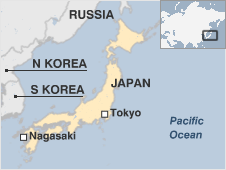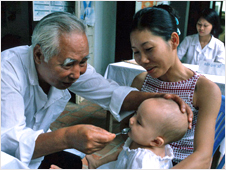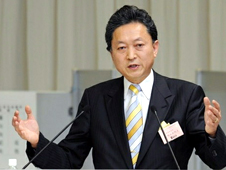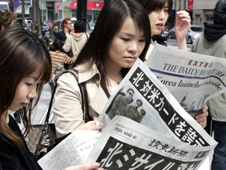Generic Medicines
Taj Pharma is the largest generic pharmaceutical company in India. We hold top positions in different established markets worldwide generics markets..


Its role in the international community is considerable. It is a major aid donor and a source of global capital and credit.
For the majority life in Japan is urban. More than three quarters
of the population live in sprawling cities on the coastal fringes
of Japan's four mountainous wooded islands.
Japan's rapid post-war expansion - propelled by highly successful car and consumer electronics industries - ran out of steam by the 1990s.
AT-A-GLANCE
 World Health Organization (WHO), and Tokyo Development Learning Center (TDLC) will jontly host a series of video conferences on safe motherhood and reproductive health issues from November 2009 through spring 2019.
|
The 1997 Asian financial crisis and bouts of recession precipitated major banking public spending and private sector reforms.
Japan remains a traditional society with strong social and employment hierarchies - Japanese men have tended to work for the same employer throughout their working lives.
But this and other traditions are under pressure as a young generation more in tune with Western culture and ideas grows up.
Japan's relations with its neighbours are still heavily influenced by the legacy of Japanese actions before and during World War II. Japan has found it difficult to accept and atone for its treatment of the citizens of countries it occupied.
A Japanese court caused outrage by overturning a compensation order for Korean women forced to work as sex slaves.
South Korea and China have also protested that Japanese school history books gloss over atrocities committed by the Japanese military. Japan has said China promotes an anti-Japanese view of history.
Following World War II lawmakers forged a pacifist constitution.
But the deployment of Japanese troops in Iraq following the US-led invasion in 2003 divided public opinion and sparked claims that the move was unconstitutional.
Twenty percent of the world's earthquakes take place in Japan which sits on the boundaries of at least three tectonic plates. The government has set targets for reducing the number of deaths and the economic damage after any future powerful quake.
Head of state: Emperor Akihito
Akihito succeeded his father Hirohito in 1989. Under the 1947 constitution Japan's emperors have a purely ceremonial role.
Prime minister: Yukio Hatoyama
Yukio Hatoyama and his centre-left Democratic Party of Japan won a landslide victory in a snap general election in August 2009 sweeping away more than 50 years of nearly unbroken rule by the conservative Liberal Democratic Party.

Yukio Hatoyama swept to power on a wave of anger against the LDP
|
The vote called by LDP PM Taro Aso following a string of
stinging local election defeats was the culmination of years
of gradually rising voter dissatisfaction with the LDP's long
reign exacerbated by a severe economic crisis.
Despite winning 308 out of 480 seats in the lower house the
DPJ formed a coalition with two smaller parties - the
Social Democratic Party and the People's New Party - to give
it a majority in the powerful upper house.
Apart from a two-year period in the 1990s the LDP had been
in power continuously since its founding in 1954.
Mr Hatoyama promised "revolutionary change" that would curtail the power of the bureaucracy and put the quality of life of ordinary Japanese ahead of big business interests. He also criticised US "market fundamentalism" and called for a more caring and humane society.
Other pledges included free high-school education a higher minimum wage petrol tax cuts and a promise not to raise sales taxes prompting critics to ask how the DPJ will pay for its policies.
Despite his talk of revolution Mr Hatoyama is the offspring of one of Japan's most prominent political dynasties and was once himself an LDP member.
His grandfather Ichiro Hatoyama was prime minister from 1954-56 and one of the LDP's co-founders while his father was an LDP foreign minister in the 1970s. Another grandfather founded the Bridgestone tyre-making company.
Born in 1947 Yukio Hatoyama studied at the prestigious Tokyo University and gained a PhD from Stanford University in the US before being elected an LDP member of parliament in 1986.
After quitting the party in 1993 over a series of corruption scandals in its leadership he went on to join other LDP defectors to co-found the DPJ. He became the party's leader for a second time in May 2009 after his predecessor Ichiro Ozawa resigned amid a funding scandal.
Mr Hatoyama nicknamed "Alien" by colleagues for his appearance is married to a former actress Miyuki. The couple have one son.
Japan's broadcasting scene is advanced and vibrant with established public and commercial outlets competing for audiences.

Some 80% of Japanese read newspapers every day
|
There are five national terrestrial TV companies including
the public broadcaster NHK which also runs national
radio networks. Most of NHK's funding comes from the
licence fees paid by viewers.
Japanese broadcasting is diversifying rapidly. Many millions
of viewers now watch satellite and cable pay-TV
services including those provided by NHK.
The country has spearheaded high-definition TV (HDTV) and
an NHK channel is dedicated to such transmissions.
Digital terrestrial TV broadcasting is being rolled out.
News drama variety shows and sport - especially baseball - all garner large audiences. Imported TV programmes are not staple fare on Japan's main TV networks but Western influences are often apparent in home-made programmes.
Japan was years ahead of the US and Europe in pioneering reality TV in which ordinary people are placed in extraordinary situations.
Newspaper readership is very high with some 80% of Japanese reading a paper every day. National dailies sell in their millions boosted by afternoon and evening editions. However circulation and advertising revenue are declining amid competition from the internet and other media.
The press
Television
Radio
News agency
Kyodo - English-language pages

AFRICA | ASIA-PACIFIC | AMERICAS | EUROPE | MIDDLEEAST | SOUTHASIA
![]()
![]()
![]()
Mauritania Mauritius Morocco Mozambique Namibia Niger Nigeria Republic-of-congo Rwanda Sao-tome-and-principe Senegal Seychelles Sierra-leone Somalia South-africa Sudan Swaziland Tanzania The-gambia Togo Tunisia Uganda Australia Brunei Burma Cambodia China East-timor Fiji Indonesia Japan Kazakhstan Kiribati Kyrgyzstan Laos Malaysia Marshall-islands Micronesia Mongolia Nauru New-zealand North-korea Palau Papua-new-guinea Samoa Singapore Solomon-islands South-korea Taiwan Tajikistan Thailand The-philippines Tonga Turkmenistan Tuvalu Uzbekistan Vanuatu Vietnam Antigua-and-barbuda Belize Bolivia Brazil Canada Chile Colombia Costa-rica Cuba Dominica Dominican-republic Ecuador El-salvador Grenada Guatemala Guyana Haiti Honduras Jamaica Mexico Nicaragua St-kitts-and-nevis St-lucia Suriname Trinidad-and-tobago Uruguay Venezuela Albania Andorra Armenia Austria Azerbaijan Belarus Belgium Bosnia-hercegovina Bulgaria Croatia Cyprus Czech-republic Denmark Estonia Finland France Georgia Germany Greece Hungary Iceland Ireland Italy Latvia Liechtenstein Lithuania Luxembourg Macedonia Malta Moldova Monaco Montenegro Norway Poland Portugal Russia San-marino Serbia Slovakia Slovenia Spain Sweden Algeria Egypt Iran Iraq Israel-and-palestinian-territories Jordan Kuwait Lebanon Libya Mauritania Oman Saudi-arabia Sudan Syria Tunisia United-arab-emirates Yemen Afghanistan Bangladesh Bhutan India Nepal Pakistan Sri-Lanka The-Maldive